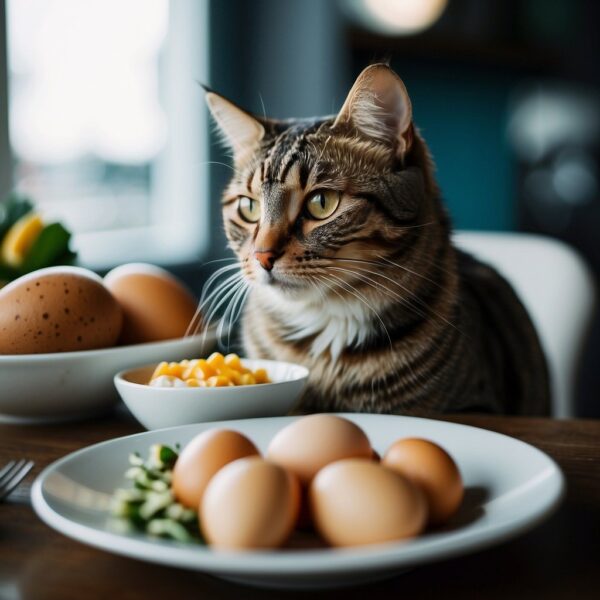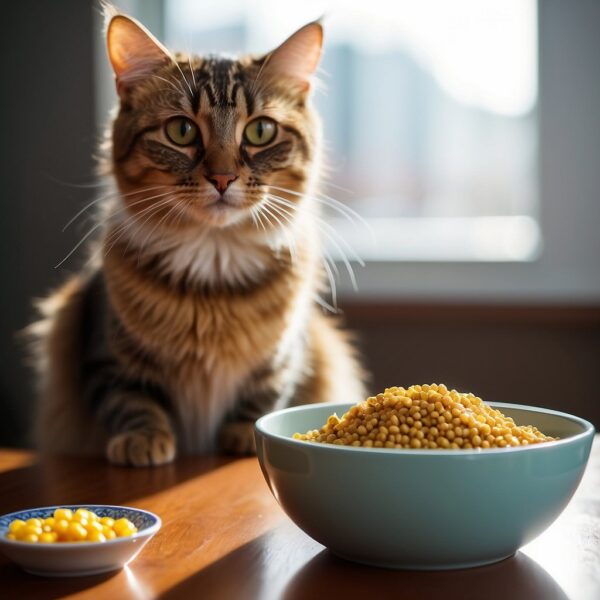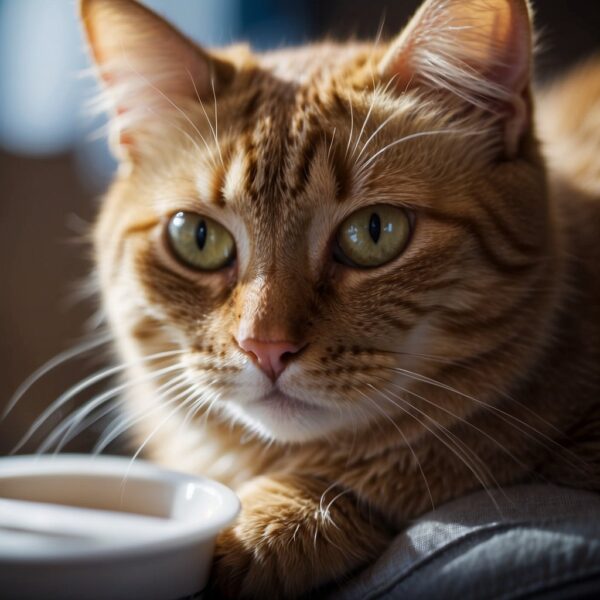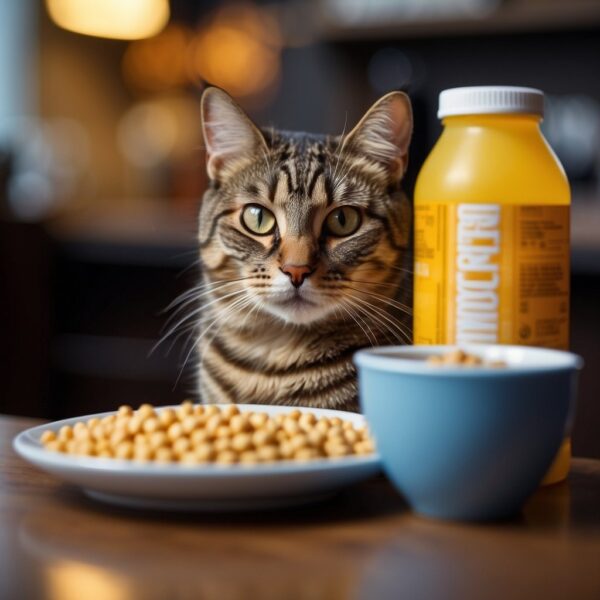
Cats and Taurine: What is Taurine
Taurine plays a critical role in cat health, an essential amino acid that cats cannot produce in sufficient quantities on their own. Unlike humans and many other animals, who can synthesize taurine from other amino acids, cats rely on their diet to obtain it. The inability to manufacture enough taurine or store it for long periods makes a taurine-rich diet crucial for cats to maintain health and prevent deficiencies.
The necessity of taurine in a cat’s diet is linked to a multitude of vital bodily functions, including vision, heart function, and reproductive health. Pregnant cats require an adequate amount of taurine not just for their own health but also for the healthy development of their offspring. A deficiency can lead to serious health issues such as developmental abnormalities in kittens, heart diseases, and impaired vision. Ensuring that commercial cat foods contain added taurine has become standard practice since the discovery of its importance to cat health in the 1980s.
Key Takeaways
- Taurine is an essential amino acid critical for cat health.
- Cats must receive taurine through their diet as they cannot produce it in sufficient quantities.
- Taurine deficiency can lead to severe health problems in cats.

The Role of Taurine in Feline Health
Taurine is a crucial amino acid for cats, integral for heart function, vision, and reproduction. Its absence in the diet can lead to severe health issues.
Essential Functions of Taurine
This essential amino acid in cats, serves multiple vital functions. Because cats cannot synthesize it in sufficient amounts, they must obtain it through their diet. This essential amino acid is critical for:
- Heart muscle function: It helps maintain proper heart contraction and health.
- Vision: Is involved in the health of retinal cells and preventing eye diseases such as feline central retinal degeneration (FCRD).
- Reproductive health: Adequate taurine levels are necessary for normal reproductive function and fetal development.
Consequences of Taurine Deficiency
A lack of dietary taurine can have serious consequences for cats:
| Consequence | Description |
|---|---|
| Congestive Heart Failure | Without taurine, cats can develop heart diseases, leading to reduced lifespan. |
| Feline Central Retinal Degeneration (FCRD) | Can result in irreversible blindness as photoreceptor cells in the eye deteriorate. |
| Reproductive Issues | Includes low birth weight in kittens and delayed growth rates. |
Taurine and Feline Cardiovascular Health
Taurine is fundamental in maintaining heart health in cats. Its role includes preventing cardiomyopathy—a condition where the heart becomes enlarged, which can result in congestive heart failure. Regular dietary supplementation is needed to avoid these severe ailments.
Taurine’s Impact on Feline Vision and Reproduction
Taurine is essential for maintaining optimal vision in cats. It prevents disorders such as Feline Central Retina Degeneration (FCRD), which can lead to a loss of vision if left unchecked. For pregnant cats, appropriate taurine levels are critical for preventing issues like low birth weight and delayed growth in offspring.
Dietary Sources and Requirements
Cats depend on a diet rich in taurine, an essential amino acid found in animal-based proteins, for optimal health and bodily functions.
Natural Taurine Sources for Cats
Natural sources of taurine include various meats and fish that are integral to a cat’s diet. Chicken, particularly the thighs, drumsticks, and liver, are significant sources of taurine. Similarly, fish offers a high taurine content, especially dark meats. For a balanced diet, it’s crucial to provide cats with a variety of these animal-based proteins to ensure sufficient intake of this essential nutrient, which supports their vision, digestion, and healthy immune system.
Common natural sources:
- Chicken (dark meat like thighs and drumsticks)
- Organ meats (especially liver)
- Fish (mainly dark meats)
Taurine in Commercial Cat Food
Commercially prepared cat food is typically formulated with the necessary taurine levels, as it is an indispensable amino acid for feline health. High-quality commercial cat food will often have taurine added to guarantee its presence, addressing the cat’s dietary needs. Cats that consume mainly commercial dry or wet food should ingest enough taurine to support their digestion, heart function, and vision, with wet cat food often being superior due to its higher meat content.
What to look for in commercial cat food:
- Labels: Presence of taurine listed in ingredients
- Type: Preferably wet cat food due to higher meat content
Taurine Supplementation Guidelines
Taurine supplements may be necessary for certain situations, such as homemade diets or when commercially prepared food does not meet the required taurine levels. Over-the-counter taurine is available in various forms, including tablets and liquids. A veterinary nutritionist can provide guidance on the appropriate dosage and whether supplementation is needed. It’s important to follow these guidelines strictly to prevent taurine deficiency, which can lead to serious health issues like dilated cardiomyopathy and reproductive failure.
Guidelines for taurine supplementation:
- Consult: A veterinary nutritionist for dosage
- Forms available: Tablets (e.g., 250mg), Liquid (e.g., 375mg/4ml)
- Usage: As advised by the veterinarian, particularly for homemade diets

Identifying and Treating Taurine Deficiency
Taurine deficiency in cats can lead to serious health issues, including dilated cardiomyopathy and vision problems. Timely recognition of symptoms and appropriate treatment are crucial for the well-being of affected felines.
Recognizing Taurine Deficiency Symptoms
Cats with taurine deficiency may exhibit a range of clinical signs. Key symptoms to look out for include:
- Visual impairment: Due to retinal degeneration which can eventually lead to irreversible blindness.
- Cardiac issues: Manifested as dilated cardiomyopathy (DCM), where the heart becomes weakened and enlarged, potentially resulting in heart failure.
- Digestive problems: Poor bile salt production can lead to gastrointestinal issues.
- Reproductive complications: Females may experience impaired fetal development and small litter sizes.
- Physical underdevelopment: Kittens may suffer from delayed growth and low birth weights.
Diagnosis and Veterinary Interventions
When a veterinarian suspects taurine deficiency, the diagnosis may involve:
- Assessing dietary history: To determine potential nutritional gaps.
- Blood tests: To measure taurine levels.
- Imaging: X-rays or echocardiograms can evaluate heart function and diagnose DCM.
- Ophthalmic examination: To check for vision impairment.
Treatment generally involves:
- Taurine supplementation: Either in tablet or liquid form, which may be a short-term or lifelong requirement.
- Dietary modification: Switching to a complete and balanced diet that meets AAFCO standards, with an emphasis on taurine-rich nutrients.
Management and Prognosis
With prompt treatment, cats can recover from taurine deficiency. Management includes:
- Regular veterinary check-ups: To monitor the cat’s progress.
- Continued supplementation: Ensuring a constant source of taurine to prevent recurrence.
Recovery depends on the severity of the condition and how quickly treatment is initiated. Dilated cardiomyopathy can potentially reverse with adequate taurine intake. However, retinal damage is often irreversible, emphasizing the importance of early detection and intervention.
Special Considerations and Controversies
In considering taurine’s role in cat nutrition, some aspects necessitate a closer look due to their implications on health and dietary practices.
Taurine in Canine vs. Feline Diets
Taurine is an essential nutrient for cats but not for most dog breeds. Unlike cats, dogs can synthesize taurine from other amino acids. However, some dog breeds like Golden Retrievers may require dietary supplementation due to breed-specific predispositions to taurine deficiency, which can lead to medical conditions like dilated cardiomyopathy or even epilepsy. Consequently, cat food is generally fortified with taurine, while dog food may not be, making it unsuitable for feline consumption due to the lack of this vital nutrient.
Debates on Taurine in Vegetarian Diets
Cats obtaining sufficient taurine from vegetarian diets remains controversial. Since taurine is primarily found in animal-based proteins, a vegetarian diet may lead to deficiencies, affecting feline growth, fetal development, and reproductive health. Although some vegetarian formulations include synthetic taurine, the bioavailability and long-term health impacts of such diets for cats are contentious topics among experts.
Taurine and Breeding Cats
For breeding cats, adequate taurine levels are critical. Insufficient taurine intake can lead to reproductive failure and growth issues in kittens. Reproductive health in felines is closely linked to their diet, and since cats store minimal taurine, consistent dietary supplementation or intake through taurine-rich foods such as dairy products, which also provide calcium, is essential. It’s pivotal for breeders to monitor dietary intake to ensure healthy litters.

Frequently Asked Questions
Taurine is an essential amino acid for cats, crucial for their health. This section answers common questions related to its importance in their diet.
Why do cats need taurine in their diet?
Cats require taurine for heart function, vision, and reproduction. Unlike some animals, cats cannot synthesize enough taurine internally and must obtain it through their diet.
What are common signs of taurine deficiency in cats?
Signs of taurine deficiency in cats include dilated cardiomyopathy, central retinal degeneration, reproductive failure, and impaired kitten growth.
How can taurine levels be supplemented in a cat’s diet?
Taurine supplementation in a cat’s diet can be achieved through taurine-enriched commercial cat foods, taurine supplements like tablets or liquids, and feeding cat-appropriate animal-based proteins.
Is there a difference in taurine requirements between wet and dry cat foods?
Yes, there is a difference: wet (canned) cat foods typically have higher taurine levels than dry cat foods. This is because the taurine content can degrade in the process of making dry food.
What are the risks of taurine overdose in cats?
Taurine overdose in cats is rare due to their ability to excrete excess amounts in their urine. However, excessively high levels without medical oversight are not recommended.
How does taurine support a cat’s overall health and wellbeing?
Taurine supports a cat’s overall health by maintaining optimal heart muscle function, vision health, and immune system performance. It is also essential for fetal development in pregnant cats.